Riley Adams's Blog, page 122
February 26, 2015
The Impact of Free Promos
By Elizabeth S. Craig, @elizabethscraig
I had to answer a questionnaire for self-publishers recently and several of the questions stumped me. I have a feeling that this isn’t a good thing.
One of the questions was ‘How many books have you sold (not given away)?’ I had absolutely no idea. And this information is not exactly as easy to come by as you might think. There is no way on your KDP dashboard to find lifetime sales.
I also had no idea how many books, total, I’d given away.
Another question was ‘What is your strongest selling title? How many units have you sold?’
Hmm.
In my defense…I have been very busy writing several series. My self-published books number six which, although not a huge number, certainly adds a bunch of lines and some complexity to each month’s KDP excel sheet.
Sadly, I did not take the excellent advice of writer Jack Welling and have one or both of my teenage children work on this stuff. Somehow my clerical needs always seem to coincide with massive projects on their end.
My printer is upstairs and my laptop was with me at the kitchen table. I pulled up all of the KDP reports from 2011 to 2015. Then I started clicking ‘print.’
I failed to notice that some of my monthly KDP reports were 12 pages long because of the number of books and the countries that the books are selling in.
I also failed to notice that I had not set up the reports to print in ‘landscape’ and not ‘portrait.’
My son, who was actually working on a computer in the room where the printer was, found me after a while. “Mom, what are you doing?” He indicated that he had just noticed some of the pages that were printing only had a few words on them.
Sigh.
Some findings from my Amazon reports (doesn’t include other retailers):
My foreign sales became strong after price matching freebies ran. Somehow, clearly, those free books gained me visibility on Amazon’s international sites. I did set it up for the international prices to be based on the US prices.
I’ve given away 429,944 free units.
Looking at the months where I had a lot of downloads of a free title, in general the sales of the same/other titles increased. But sometimes, the sales the following month declined and then dramatically bumped up the next month. I’ve never seen sales decline more than one month following a free promo.
So, I conclude that free promos tend to give me visibility in international markets as well as here at home. That bump in income may not show up the following month, but two months later. I think that, for me and my genre and with the number of titles I have, free is a good strategy for me for visibility in a crowded marketplace. I recently read a thought-provoking post from Jane Friedman: “The Strategic Use of Book Giveaways and How They Can Increase Earnings Potential.” In it, Jane says, “Giveaways (or freebies) are popular for good reason; they’re a classic, frictionless way to make people aware of your work.”
Strategies for the free books?
I was interviewed on Tuesday by Camille Fabre-Pergola and Phin Lambert at Vook and they asked me if I had a strategy for which titles were free. It was a good question and it made me realize how undeliberate I can be when I’m running a free book promo. Since my books don’t really have continuing subplots, I haven’t found it strictly necessary to make the first book in the series free. In fact, I can’t make the first book in the series free, because it was traditionally published by Midnight Ink (and that ebook is actually currently priced over $8, I believe).
So I choose my free title a bit differently, since I have no control over the pricing of that first book and the books don’t have a continuing story arc. Usually I take a look at the Amazon ranking and reviews of all the titles. If there’s a title that could really benefit from a boost in either rank or number of reviews, I pick that one. I make the book free on Smashwords and then Amazon (usually very quickly…24 hours?) price matches.
Things I’m going to start tracking better (some related to free promotions, some for other data):
Sales per title (unless/until Amazon does a better job helping us collect it on the dashboard). I still don’t know my strongest title or the number of units because I completely ran out of time. I think this will be something I give the 13 year old to do on a rainy day when she has little homework.
Monthly sales totals.
Monthly downloads totals.
And to keep up with it better, I’m going to print out those reports each month. Then I won’t have such a huge chore. Somehow, it’s easier for me to add the stuff up when it’s on paper.
Have you tried these types of promotions? How did it work for you? Any revelations of your own from your sales and downloads reports?
Tweetable:
Potential benefits of free book promos: http://bit.ly/1BDBrhZ via @elizabethscraig (Click to Tweet)
Image: from Death to the Stock Photo
The post The Impact of Free Promos appeared first on Elizabeth Spann Craig.
February 25, 2015
Thoughts on Being a Hybrid Writer
by Elizabeth S. Craig, @elizabethscraig 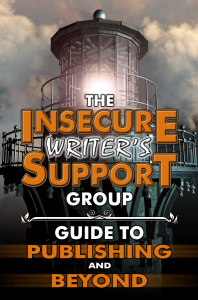
What’s it like being a hybrid writer (someone who both publishes traditionally and self-publishes)?
Today I’m at the Insecure Writer’s Support Group listing pros and cons of being a hybrid writer and tips for making it work. Hope you’ll pop over and join me.
The post Thoughts on Being a Hybrid Writer appeared first on Elizabeth Spann Craig.
February 22, 2015
Randomizing Revision
by Leslie Budewitz, @LeslieBudewitz 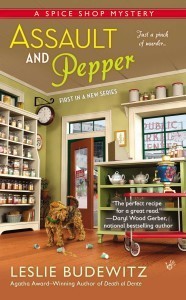
I take a methodical approach to revision. As I work on the draft, I start a list of “Revision Notes”—facts to check, inconsistencies to iron out, name changes to clean up. When the draft is complete I print it out and punch it into a fat, three-ring binder. I make an outline, adding to the Revision Notes as I go, with some comments organized by chapter and some by topic. (“Jen or Jenn?;” “Deepen Pepper’s doubts about investigating;” “Kristen lecture Pepper about getting involved with Tag twice? Earlier is better.”)
Then I start the read-throughs, which I sometimes call drafts even though I’m working from the same physical copy. Each read-through involves a different layer of the ms. In the plot draft, I fix the holes I’ve identified in the outline and others that jump out at me as I work. In the character draft, I make sure the protagonist drives the action (I write in first person) and that every secondary character pops. In the scene draft, I sharpen the goals, motivation, and conflicts, and make each transition clear, so the reader never wonders about time or place. I look to make sure I’ve kept it cozy, that I’ve never lost track of the dog, and that I’ve given my protagonist all the trouble she can handle—and then some.
But the final step may be the most important, because it introduces a key element to my otherwise orderly process: randomization. That’s the “Repetitive Word draft.” Like every writer, I’ve got my pet words: still, only, really, turn, smile, perfect. Every book seems to develop its own overused vocabulary. This stage eliminates unconscious echoes, and helps me sharpen my characters’ observations and introduce more variety and vibrance. In my latest ms., second in my Spice Shop Mysteries, my protagonist Pepper seemed to adore everything she didn’t find odd; she laughed too much, and overused the word figure, in a variety of contexts. Chili and chile went on the list because I continually mistyped them, as did Viaduct, a proper noun when referring to the elevated highway running along the Seattle waterfront. In my Food Lovers’ Village Mysteries, I tend to repeat fresh and local. (Worthy concepts; overused words.) After I read a blog post on describing characters’ voices, I got a little carried away with that aspect of craft, so voice and tone went on the list.
But even more than making sure I don’t turn head into a synonym for walk three times on the same page, this process helps me catch (spot, nab) repetitive structure. I use the Find function, jumping from one instance of the target word to the next. I may land on two consecutive pages or skip several chapters. By taking context out of the picture, I can see what I’ve actually written—not what I think I’ve written. I’m not reading chronologically, so it’s easier to recognize repetitive thoughts or phrases and unnecessary sentences. An overused phrase often indicates a clause or sentence that can be eliminated. Sometimes it’s a filtering phrase—“I thought…”, “… caught my attention,” “I felt…”—that creates a distance between narrator and reader. Deleting it allows me to go a touch deeper into my protagonist’s POV.
Some overuses are easy to overlook because words like could, with, and though are so ordinary, so necessary. Do I really replace a good chunk of them? Yes and no. The eye scans over many of these words, and often, they are exactly the right word. But the real importance of the exercise is to show me where I’ve been tentative instead of bold, made a phrase conditional, pulled punches in my dialogue.
An example of a word that shows up too often in the same way—at least for me; your linguistic quirks may vary—is with. I tend to toss it into descriptions far too often. For example, my protagonist, Pepper Reece, describes a chef who comes into her shop this way: “Tamara vibrated with intensity, her presence boosting everyone around her to a higher frequency.” And only seven lines later, Pepper thinks of her this way: “Thin and wiry—from hard work, not workouts—her features too intense to call pretty. But she buzzed with an irresistible energy.” It’s a common sentence structure, but not one for every page.
These searches show us our weak spots.
Because of the random factor, I sometimes notice unnecessary words or phrases apart from those I’m searching for. And though I’ve already deleted dozens of throat-clearing phrases and eliminated thoughts or phrases that belonged in earlier drafts but don’t relate to action in the current version, I still find those stragglers, artifacts of previous thoughts that no longer fit. Out they go. They’re easier to spot when you’re not reading for substance. As a bonus, you may spot missing words or punctuation errors, too, because when the eye sees out of context, it doesn’t make the automatic corrections that trip us up.
For a 75,000 word ms., the process may take me two days. It can be tedious. But I can eliminate several hundred words without eliminating action. And the real payoff is a stronger, tighter manuscript.
Leslie Budewitz is the national best-selling author of DEATH AL DENTE, first in the  Food Lovers’ Village Mysteries set in northwest Montana, and winner of the 2013 Agatha Award for Best First Novel, and the sequel, CRIME RIB (2014). ASSAULT & PEPPER, first in her Spice Shop Mysteries will debut in March 2015 from Berkley Prime Crime. Pepper Reece, owner of the Seattle Spice Shop, thinks she can handle any kind of salty customer—until a murderer ends up in the mix…
Food Lovers’ Village Mysteries set in northwest Montana, and winner of the 2013 Agatha Award for Best First Novel, and the sequel, CRIME RIB (2014). ASSAULT & PEPPER, first in her Spice Shop Mysteries will debut in March 2015 from Berkley Prime Crime. Pepper Reece, owner of the Seattle Spice Shop, thinks she can handle any kind of salty customer—until a murderer ends up in the mix…
Also a lawyer, Leslie won the 2011 Agatha Award for Best Nonfiction for BOOKS, CROOKS & COUNSELORS: HOW TO WRITE ACCURATELY ABOUT CRIMINAL LAW & COURTROOM PROCEDURE (Quill Driver Books), making her the first author to win Agatha Awards for both fiction and nonfiction.
Leslie blogs for writers on using the law accurately in their fiction. Visit her blog. http://www.LeslieBudewitz.com/blog
Find her on Facebook http://www.Facebook.com/LeslieBudewit...
or on Twitter http://www.Twitter.com/LeslieBudewitz
The post Randomizing Revision appeared first on Elizabeth Spann Craig.
February 21, 2015
Twitterific Writing Links
by Elizabeth S. Craig, @elizabethscraig

Twitterific writing links are fed into the Writer’s Knowledge Base search engine (developed by writer and software engineer Mike Fleming) which has over 30,000 free articles on writing related topics. It’s the search engine for writers.
5 Reasons To Outline Your Novel – before you write a word: http://ow.ly/J3hMd @writers_write
What Your First 250 is Telling Your Readers: http://ow.ly/J3hMf @ava_jae
Copyright Basics: http://ow.ly/JrrU7 @LeslieBudewitz
5 Ways To Sell More Books On Amazon: http://ow.ly/J3hMg @selfpubreview
How to Send Review Copies of Your Book to Potential Reviewers: http://ow.ly/J3hMh @miralsattar
Where to send ARCs: http://ow.ly/J3hMj @MarcyKate @WriteAngleBlog
How Susan Orlean Writes With Evernote: http://ow.ly/J3hMk @susanorlean
4 Ways to Make Readers Instantly Loathe Your Character Descriptions: http://ow.ly/J3hMm @KMWeiland
7 Writer Friendship Truths as told by a Cartoonist: http://ow.ly/J4UEl @wayneepollard
Revising Your NaNoWriMo Mess-terpiece : http://ow.ly/J4VEs by Heather Fenton
Trying too painfully, achingly hard to write The Great American Novel: http://ow.ly/J4VEt by Paul St John Mackintosh
The ‘Chekhov’s Gun’ Guide to Foreshadowing: http://ow.ly/J4VEv @BetterNovelProj
Reading the First American Novel, Published 226 Years Ago: http://ow.ly/J4VEz @DanPiepenbring @ParisReview
How to Approach Authors in the Wild: http://ow.ly/J4VEB @DelilahSDawson
How Much Information is Safe to Share Online? http://ow.ly/J4VEC @EdieMelson
10 Tips for YA Romance: http://ow.ly/J4VEI @BetterNovelProj
5 Easy Tips to Fix a Boring Online Bio: http://ow.ly/J4VEJ @JudyLeeDunn
Series or Stand-alone? http://ow.ly/J9TVV @SkylarkLit
How Not to Write a Logline: http://ow.ly/J9TVZ by Angela Bourassa @scriptmag
Anti-villain motivations besides ‘tragic past': http://ow.ly/J9TW0 from The Right Writing
Why Email Newsletters? http://ow.ly/J9TW2 @DanBlank @writerunboxed
How to Prepare for a Pitch Contest: http://ow.ly/J9TW3 @ava_jae
From the Writer’s Perspective: How to Get In on the SEO Scene: http://ow.ly/J9TW7 @freelancewj
25 Things You Should Know About Antagonists: http://ow.ly/J3hMa {lang.} @ChuckWendig
Show, Don’t Tell: Revealing True Emotion In Dialogue: http://ow.ly/J3hM9 @angelaackerman
Women in publishing on today’s #FutureChat (4pGMT / 11aET / 8aPT) (now): http://ow.ly/Jo1Od @Porter_Anderson
Tension & Pacing in Your Fiction: http://ow.ly/Jo0OX from Jack Smith
When picture books are ‘overly didactic': http://ow.ly/J3hM8 @literat
Grammar Rules: Capitalization: http://ow.ly/J3hM6 @writingforward
Writers’ cliches that make you tear your hair out: http://ow.ly/J3hM5 @alisonflood
The One-Page Synopsis | http://ow.ly/J27hX @nancyjcohen
Author Lessons from the Shark Tank: http://ow.ly/J27hT @wherewriterswin
Finding and Honing In On Your Story: http://ow.ly/J27hR @kiersi
Google Docs vs. Scrivener for Writing: http://ow.ly/J27hP @jamietr
Ambient and white sound for writing: http://ow.ly/J27hN from Paperback Writer
7 Deadly Sins of Worldbuilding http://ow.ly/J27hL @charliejane
4 Danger Signs To Search For, Before Sending Off Your Novel: http://ow.ly/J27hJ @charliejane
19 Tips from Famous Writers: http://ow.ly/JkZCv @esporter
(Impossibly Condensed) Checklists for Beginning a Novel: http://ow.ly/J27hG @randysusanmeyer
Confusion around the term ‘hybrid’ in publishing: http://ow.ly/JjB3M @Porter_Anderson @BennettColes
How to Deal With Writing Distractions: http://ow.ly/J27hE @QuipsAndTips
Online tools for writers: http://ow.ly/J27hz @sherice
The Late Blooming Novel: http://ow.ly/JjAST @janice_hardy @AlexJCavanaugh
12 Book Marketing Tips from 12 Industry Experts: http://ow.ly/J26xR @booklaunchdemon
Who discovers the body in crime fiction? A chart: http://ow.ly/JjA1d @mkinberg
The Ebook as Annuity: http://ow.ly/J27ht @markcoker
How ‘Into the Woods’ Got it Wrong (And Why You Should Too) : http://ow.ly/IXVLE @epbure
6 Things Your Website Should Tell Book Reviewers About You (and Your Book): http://ow.ly/IXVLt @bookgal
The author photo: where to use them, tips for getting one done: http://ow.ly/IXVLn @MyBookShepherd
Freelancers: 3 Tip-Offs That Your Dream Writing Job Will Really be a Nightmare: http://ow.ly/IXVLk @ticewrites
How Much Does It Cost to Self-Publish a Book? 4 Authors Share Their Numbers: http://ow.ly/IXVLj @thewritelife @hopeclark @thecreativepenn
Storium: Collaborative Storytelling: http://ow.ly/IXVLe @woodwardkaren
Finding a Plot Structure: http://ow.ly/IXVLb @KayKeppler
3 Truths about Being a Poet as Told by a Cartoonist: http://ow.ly/IXEIU @wayneepollard
Fantasy Sub-Categories: http://ow.ly/IXVL4 @dreamoforgonon
A trend toward older characters in crime fiction? http://ow.ly/IXVL1 @mkinberg
Reaching Readers through Wattpad and Blog Tours: http://ow.ly/JfDwF @CheleCooke @RicardoFayet @ReedsyHQ
How Being Specific Helps You Show And Not Tell: http://ow.ly/IXVKV @MiaJouBotha
The Cheater’s Guide to Building Your Author Platform: http://ow.ly/IXVLy @SueDetweiler
How to Query: Research (video): http://ow.ly/IRFf2 @ava_jae
Weaving Social Narratives Beyond the Page: Transmedia: http://ow.ly/IRFf1 @hackettkate
Tips for writing endings: http://ow.ly/IRFeX @charliejane
How to Utilize Tension More Effectively: http://ow.ly/IRFeT @jodyhedlund
How to Place Turning Points on a Beat Sheet: http://ow.ly/IRFeQ @jamigold
French Readers are Just as E-Trashy as Everyone Else http://ow.ly/IRFeN @EdNawotka
How many rejections (is the wrong question): http://ow.ly/IRFeK from agent @Janet_Reid
7 Things You Learn When Your Book Is Published: http://ow.ly/IRFeJ @MartinaABoone
Rewrite an Old Manuscript or Let it Die? http://ow.ly/JboBi @LyndaRYoung
Finding Your Writing Process – A Procrastinator’s Journey: http://ow.ly/IRFeG @dannymanus
How to Break Up with your Novel: http://ow.ly/IRDIL @marthamconway @womenwriters
Make Editing Easier: Simple Tips to Make Your 1st Draft Better: http://ow.ly/JbjPw @silas_payton
How to Write A Plausible Character: – 3 Key Tips: http://ow.ly/IRFeP @AnneLParrish
Why Your Writer’s Bio is Valuable Real Estate: http://ow.ly/IRFeH @EdieMelson
Music For Writers: The Pettersson Legacy Of Fire And Ice: http://ow.ly/J4U1D @Porter_Anderson @ThoughtCatalog
10 Rules For Making Better Fantasy Maps: http://ow.ly/INHZY @io9 @LaurenDavis
What Are We Rewarding In Children’s Literature? (#GuysDoRead) http://ow.ly/J7Euc @Porter_Anderson @scribblestreet
Bisexuality in SF: http://ow.ly/INHZT @ceciliatan
3 Tips to “Show, Don’t Tell” Emotions and Moods: http://ow.ly/INHZH @joebunting
Picking a Juicy Secret to Jazz Up Your Character: http://ow.ly/INHZD @writingeekery
A Case Study on Trust as a Literary Theme: http://ow.ly/INHZA @DIYMFA @SaraL_Writer
‘Are there too many literary agencies?’ http://ow.ly/J7DKs @Porter_Anderson @JonnyGeller
The Only Rule About Backstory That Matters: http://ow.ly/INHZv @KMWeiland
Understanding Phrasal Verbs – 2 word verbs with ‘get’: http://ow.ly/INHZt @writers_write
Worldbuilding: Creating Fictional Cultures: http://ow.ly/INHZk @authorjsmorin
A Kindle Book Marketing Tip: http://ow.ly/INHZe @angee
Improve Your Twitter Messaging and Control: http://ow.ly/J7xr3 @jimhbs
One Author’s Debut Year: Indie Income versus Expenses: http://ow.ly/INHZP @JessiGage
One Indie Author’’s Debut Year Income: http://ow.ly/INHZK @JessiGage @passivevoiceblg
5 Comics Writers Who’ve Received Rejection Letters Will Understand: http://ow.ly/INHZ9 @wayneepollard
Perceived differences between ‘us’ and ‘them': http://ow.ly/J4TOe @Porter_Anderson
How to Rethink Creative Opportunities: http://ow.ly/ILtDU @CreativeKatrina
Mental Illness In Fiction: Getting It Right: http://ow.ly/ILyXQ @DanKoboldt
Balancing World Building and Pacing: http://ow.ly/ILyXM @janice_hardy
5 Key Elements for Successful Short Stories http://ow.ly/ILwXo @EmilyWenstrom
Scenes: The Skeleton of a Novel: http://ow.ly/ILyXI @fictionnotes
7 Tips For Authors Who Want to Evolve into Book Publishers: http://ow.ly/ILyXD @JFBookman
The post Twitterific Writing Links appeared first on Elizabeth Spann Craig.
February 19, 2015
Tension & Pacing in Your Fiction
Guest Post by Jack Smith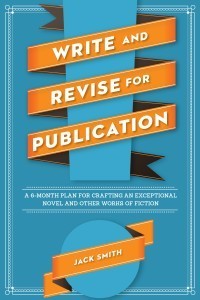
Fiction depends on tension. Tension—a felt response to conflict—must be heightened as well as diminished in a literary work. Where this is accomplished depends on the nature of the plot and the character arc. While tension is created by practically every story element, pacing is largely a result of style and narrative technique. The pacing of a work affects the tension but also creates mood and tone. In every fictional work you write, you must decide on both tension and pacing. While much of this may be a matter of intuition and feel, you can also plan out matters of tension and pacing as you write and revise your work. This amounts to a six-stage process.
I. Decide on the nature of the tension in your story or novel. Basically there are three major types of fictional works according to tension.
A. The five-stage plot structure, where tension must be gradually (though not continuously) increased to the story’s crisis and climax, followed by falling action and denouement.
B. The epiphany story where tension gradually builds toward a final, rather sudden, clarifying vision, on the part of the protagonist.
C. The story where tension builds at times, is released, or partly released, but does not build toward a climax at the end—but rather closes with the protagonist’s psychological distillation of several bumps along the way, no one bump necessarily involving more tension than the others.
II. As you rework and rethink your story or novel, decide how and where you might increase the tension and decrease it.
A. Consider your protagonist. What is likely to produce tension in this character? What is likely to relieve it?
B. What will be the main events that carry out your character’s overall trajectory? How are these tension-producing events?
C. What events will produce a reduction of tension? How are these events needed to develop your character’s overall trajectory?
III. Now work/rework your manuscript to make sure scenes create tension where needed, or decrease tension where needed.
A. In scenes that increase tension, depend on action and dialogue that emphasize conflict—conflict central to advancing the plot.
B. In scenes meant to relieve tension, depend on action and dialogue that decrease conflict, suggesting temporary resolution, compromises reached, hope for the future, and the like—all such scenes advancing the plot.
IV. Now work/rework your story or novel manuscript to make sure that expository sections of character thought and reflection represent increases in tension and times when this tension subsides.
A. Characters naturally respond to the external tensions in their lives. In your protagonist’s various thoughts and reflections, build this tension by exploring it for its possible negative, and even dire, effects of various kinds.
B. In sections where the tension subsides, provide moments of character reflection where feelings of relief occur, or even feelings of hope, At other times, find ways to have your protagonist think about other things besides the central tensions in his/her life, the ones that are driving the plot.
V. Make sure the pacing—whether in scene or narrative prose—contributes to the desired tension. Be sure the mood and tone created by the pacing is right for your work.
A. When the prose is smooth, fluid, easy-flowing, there is little tension—or apparent tension, at least.
B. When the prose is rapid-paced, the tension tends to increase, suggesting a positive feeling (e.g. excitement) or a negative one (e.g. worry or fear).
C. Decide on the right pacing for your story or novel, going through it scene by scene, and prose section by prose section. Which pacing creates the desired tension? Reduces the tension, as needed? Which pacing creates the right mood and tone?
VI. The narrative technique also creates pacing, and it too affects mood and tone.
A. If a story or novel is fragmented, with short, clipped sections, or white spaces that cause the reader to make “leaps,” this will suggest disorientation.
B. If a story or novel is traditionally narrated, with narrative bridges between sections, this may suggest a measure of coherence in the protagonist’s world (though such coherence can certainly be called into question by events and character reflection).
C. Decide on the right narrative technique for your work. Does it help create the right pacing—contributing to the desired tensions in the work? Does it create the right mood and tone?
Every literary work, short story or novel, must include tension—a felt response to conflict. A work without tension is almost unthinkable if it’s about life at all. But tension itself isn’t enough. You must handle the tension so that it builds, releases, builds, and also contributes to the advancement of the plot and overall character arc. You must also handle the pacing well, choosing the pacing that will contribute to the tensions in the work and help create the right mood and tone. Finally, you must choose the right narrative technique.
Jack Smith is author of the novel Hog to Hog, which won the George Garrett Fiction Prize (Texas Review Press. 2008), and is also the author of Write and Revise for Publication: A 6-Month Plan for Crafting an Exceptional Novel and Other Works of Fiction, published earlier this year by Writer’s Digest. His novel ICON was published in June 2014 by Serving House Book
Prize (Texas Review Press. 2008), and is also the author of Write and Revise for Publication: A 6-Month Plan for Crafting an Exceptional Novel and Other Works of Fiction, published earlier this year by Writer’s Digest. His novel ICON was published in June 2014 by Serving House Book
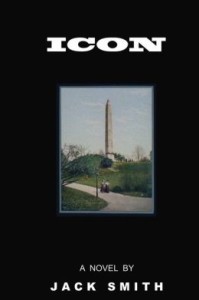 Over the years, Smith’s short stories have appeared in North American Review, Night Train, Texas Review, and Southern Review, to name a few. He has also written some 20 articles for Novel & Short Story Writer’s Market, as well as a dozen or so pieces for The Writer.
He has published reviews in numerous literary journals, including Ploughshares, Georgia Review, Missouri Review, Prairie Schooner, American Review, Mid-American Review, and the Iowa Review.
Over the years, Smith’s short stories have appeared in North American Review, Night Train, Texas Review, and Southern Review, to name a few. He has also written some 20 articles for Novel & Short Story Writer’s Market, as well as a dozen or so pieces for The Writer.
He has published reviews in numerous literary journals, including Ploughshares, Georgia Review, Missouri Review, Prairie Schooner, American Review, Mid-American Review, and the Iowa Review.
The post Tension & Pacing in Your Fiction appeared first on Elizabeth Spann Craig.
February 15, 2015
Writers–It Doesn’t Pay to be Shy
By Elizabeth S. Craig, @elizabethscraig
Not all writers are introverts, of course. I’m one of the more introverted ones. My introversion can veer into shyness around readers…I’m not a shy person otherwise.
There are definitely things I’m more comfortable doing than others. I hate readings and signings. But I don’t mind signing stock in bookstores or (now), telling people that I’m a writer. And there are things I don’t enjoy doing that I now just suck up and do.
Even introverted writers should consider:
Wattpad. This online publishing platform is a good way to get our work in front of a younger/different audience. Yes, we’ll need to interact with readers there.
Newsletters. It took me years to get to the point where I’d “bother” a reader with a newsletter. I’ve only been sending them for a little over a year. Even though readers signed up completely voluntarily to be on my newsletter list. Each time I send them, my numbers on Amazon get better.
Events. I’m very, very picky about the events I’ll do and send more nos than yesses to invitations. But the ones I do usually have good turnouts and I do sell books and meet readers. After I’m done, I realize I’ve enjoyed them.
Signing stock. Easy. I go into bookstores, show my driver’s license or show the staff that the author photo looks like me, and sign the books. They put a sticker on the front that states autographed copy. I never see a reader this way.
Goodreads giveaways (no human interaction here! Perfect for the shy writer!)
Telling friends and acquaintances you’re a writer. This can be done fairly painlessly by putting a link to your books or your site as the signature on your emails.
Landing a guest spot for a blog tour or a place as a regular blogger on a group blog. If you want a guest blogging opportunity or to be a member of a group blog, you need to reach out to bloggers. This was something I didn’t understand when I started blogging six years ago. I thought the appropriate etiquette was to wait to be invited. It’s not. Although there are best practices when it comes to requesting guest posts. I’ll cover that in a later post.
Asking for help:
Reaching out to primary sources for research. It can be a lot speedier than searching up very specific bits of information online. Police officers have been happy to help me when I’ve called their departments. And I don’t think they thought I was a budding criminal (most of the time).
Asking for blurbs/endorsements. If you’re starting out, you probably need them. Authors will tell you if they don’t have the time and most bigger name authors expect to be asked.
Times you should put your foot down and not even consider being shy or at all reticent:
A bad contract is much, much worse than no contract at all. Don’t sign your rights away to your content. Here are some posts that may help you understand your contract: Susan Spann’s “How Bad Can One Page Be? The Hidden Dangers in Short-Form Contracts,” Victoria Strauss’s “Publishing Industry Terms and Contracts: Some Resources, and Some Advice,” David P. Vandagriff’s (Passive Guy’s) “How to Read a Book Contract – Agents and the Law.”
Not all agents are good agents. Not all publishers are good publishers. Just because these folks say something is so, doesn’t make it so. Places to research agents and publishers are the Preditors and Editors listing and Victoria Strauss’s Writer Beware.
Sometimes professional editors’ “corrections” need to be corrected. Stet is a useful word to know. For one trad-published series (I no longer work with this editor), an editor corrected an entire couple of pages to first person. The book was written in third.
These are just a few examples of times it pays to be outgoing as a writer. Can you think of anything I’ve overlooked?
The post Writers–It Doesn’t Pay to be Shy appeared first on Elizabeth Spann Craig.
February 14, 2015
Twitterific Writing Links
by Elizabeth S. Craig, @elizabethscraig

Twitterific writing links are fed into the Writer’s Knowledge Base search engine (developed by writer and software engineer Mike Fleming) which has over 30,000 free articles on writing related topics. It’s the search engine for writers.
6 Ways to Rebalance Your Being to Enhance Your Creativity: http://ow.ly/IHAus @WriterJoMalby
8 Query Tips No One Tells Writers: http://ow.ly/IHAut @carlywatters
Conquer Drowsiness with 10 5-Minute Easy Exercises: http://ow.ly/IHAux @colleen_m_story
Unnecessary words and phrases to cut: http://ow.ly/IHAuy @writers_write
How Does Money Taint Art? http://ow.ly/IHzOO @ArtistThink
How to Face Criticism in Creativity http://ow.ly/IHAuA @ArtistThink
Power of the Space Between Creative Bursts: http://ow.ly/IHAuB @CreativeKatrina
How Realistic Is Science Fiction Linguistics? http://ow.ly/IHAuC @slate @dsbigham
Are You Making These Mistakes That Lead to Carpal Tunnel? http://ow.ly/IHAuD @colleen_m_story
10 Things Every New Creator of SF Should Know: http://ow.ly/IHAuF @charliejane
The Myth of the Overnight Success and What Those Stories Have in Common: http://ow.ly/IHAuH @carlywatters
Waiting for Someone Else to Validate your Creativity? http://ow.ly/IHAuI @CreativeKatrina
Top 10 Ways To Love Your Reader: http://ow.ly/J1AgV @10minnovelist
Components of book proposals: http://ow.ly/ILyWS @behlerpublish
Early stages of character creation: http://ow.ly/ILyX2 @kayedacus
Handy Tricks for Using Word: http://ow.ly/ILyXd @Savage_Woman
How to Tell if Back Story is Sabotaging Your Novel: http://ow.ly/ILyXn @Roz_Morris
Make sure your theme isn’t a cliché: http://ow.ly/ILyXq @nownovel
How To Use Scrivener to Plan a Book: http://ow.ly/ILyXx @Natasha_Lester
Love Your Reader, Love Your Art, Love Yourself: http://ow.ly/J1Akk @AnnaKSnow @10minnovelist
5 Laws of the Fiction Reader http://ow.ly/IFyfo @jamesscottbell
Coming Up with Your Story’s Premise: http://ow.ly/IFyfl @KillerNashville @JadenTerrell
Trad published authors–pay attention to your backlist: http://ow.ly/IFyfk @kristinerusch
Crime Writers: Are You Writing What You THINK You Know? http://ow.ly/IFyfj @LeeLofland
How To Create A Killer Opening For Your Science Fiction Short Story: http://ow.ly/IFxQw @charliejane
Agents should ‘join forces to build the next generation of talent': http://ow.ly/IFyfg @JonnyGeller @TheBookseller
Should You Self-Publish? 5 Questions to Ask Yourself: http://ow.ly/IFyff @ClaireCookwrite
Symbolism for cover design: http://ow.ly/IFyfd @cjgmanlapas
What the Incredible Hulk Can Teach Us about Emotion in Fiction: http://ow.ly/IFyfb @HDemchick
How To Get Stuff Done When You Don’t Want To: http://ow.ly/IFyfa @AllisonStadd @99u
Creating Compelling Characters Readers Can’t Forget: http://ow.ly/IFyf9 @RuthHarrisBooks
The Definition and Criteria of Concept: http://ow.ly/IFyf8 @storyfix
5 Ways to Make Your Character Stand Out: http://ow.ly/IB3Zk by Chris Winkle @Mythcreants
5 Classic Women Authors on Writing and Money: http://ow.ly/IB3Zg @ladieswhowrite
3 Act Story Structure: Act Three: http://ow.ly/IB3Ze @woodwardkaren
Tricks of the Trade 1: The Plant: http://ow.ly/IB3Zb @mooderino
The Sum of the Parts: Writing a Synopsis: http://ow.ly/IB1KS @Janice_Hardy
What not to say to authors (and what to say instead): http://ow.ly/IB3Z7 @holly_bourneYA
Jobs That Leave You Time to Write: http://ow.ly/IB3Z5 @stevegillman
The Why & How of Foreshadowing: http://ow.ly/IB3Z2 by Chris Winkle @Mythcreants
Queries are never wastes of agents’ time: http://ow.ly/IB3YU @Janet_Reid
Help for writing a child’s emotional state: http://ow.ly/IB3YR from Writeworld
Marketing, Social Media & Book Signings: —Why None of These Directly Impact Book Sales: http://ow.ly/IB3YZ @kristenlambtx
What the “Sorting Hat” Teaches Us About the Hero’s First Obstacle: http://ow.ly/IB1mE @BetterNovelProj
Why Your Brain Needs More Downtime: http://ow.ly/Ix8qK @sciam @ferrisjabr
How limiting creative choices enhances creativity: http://ow.ly/Ix8qG @onewildword
Rejection letters and writer reactions: http://ow.ly/Ix8qF from Teresa Nielsen Hayden
The 5 Best Things an Artist Can Do: http://ow.ly/Ix4Gt @garrettrauthor
Remember Why Readers Seek You Out Online: http://ow.ly/Ix8qE @RachelLKent
10 page-to-screen successes: http://ow.ly/Ix8qB by Meredith Quinn for @thewritermag
6 Sub-Plots That Add Style To Your Story: http://ow.ly/Ix8qz @writers_write
Ingredients for a tough character: http://ow.ly/Ix8qx @VickyThinks
Tips to Include Family in Your Writing Life: http://ow.ly/Ix8qu @BDBrady007
What do names tell us about characters? http://ow.ly/Ix8qs by FCETIER
How E-Books Have Changed the Print Marketplace: http://ow.ly/Ix8qp @Janefriedman
Writing science…a few tips: http://ow.ly/Ix8qn from Captain Shellhead
Writing Tips: Write What You Know: http://ow.ly/It3SR @writingforward
30 Tips For Writing a Book in 30 Days: http://ow.ly/It3SN @JessicaStrawser
Tips for Your Author Website: http://ow.ly/It3SK by Kiffer Brown for @wherewriterswin
9 traits of a good agent and 3 contract issues to watch out for: http://ow.ly/IQn2I @Porter_Anderson @MirabilisDave @AgentKristinNLA
How To Grow Your Fiction Email List Subscribers: http://ow.ly/It3SI @thecreativepenn
How to Use Needs and Goals to Appeal to Readers: http://ow.ly/It3SD @jamigold
Would you turn this bestselling author’s first page? http://ow.ly/It3SA @RayRhamey
40 Questions to Ask When You Get the call from an Agent: http://ow.ly/It3Sy @MartinaABoone
Most authors break through in middle-age: http://ow.ly/It3Sv @alice_emily @telegraph
Creating Character Names: A Great Time Saver All Writers Should Use: http://ow.ly/INuuC @silas_payton
Switch from passive to active voice: http://ow.ly/It3Ss @sharilopatin
An Author Assistant Answers Writers’ Questions: http://ow.ly/IOCZe @K8Tilton
5 Ways Marketing Can Revive Your Series: http://ow.ly/It3Sq @srjohannes
Productivity Tip: Learn how to say no: http://ow.ly/It3Sn @inkyelbows
5 Tips for Writing Twist Endings: http://ow.ly/It3Sj @DinoLaserbeam
Music For Writers: Self-Pubbing Cellist Kate Dillingham: http://ow.ly/IJixy @KateDillingham1 @Porter_Anderson
Resources to improve your grammar: http://ow.ly/IrKoC from Reference for Writers
Synonyms for walk: http://ow.ly/IrKoA from Green Haven
The Three Writing Mindsets: http://ow.ly/IrKox @berkun
11 Secrets to Writing Effective Character Description: http://ow.ly/IrKov by Rachel Scheller for @writersdigest
Underground Fantasy: Tunnels and Secret Passageways: http://ow.ly/IrKor @SteffHumm
5 Top Author Platforms and 4 Takeaways from Them: http://ow.ly/ILAQv @EmilyWenstrom @DIYMFA
How clearing clutter helped one writer: http://ow.ly/IrKoo by Elizabeth King Humphrey
Are ebooks really here forever?” http://ow.ly/IJhP6 @Porter_Anderson @TheBookseller”
Commonly Confused: Comparatives and Superlatives: http://ow.ly/IrKok @Savage_Woman
Some pace-slowing and barrier-creating words to consider dropping in our novels: http://ow.ly/IrKoj @raynehall
The home life of cops and PIs in crime fiction. How much to include? http://ow.ly/IJg62 @mkinberg
5 self-publishing truths few authors talk about: http://ow.ly/IrKog @HearnDylan
On writing musicals: http://ow.ly/IrKod from Writeworld
3 Tips for Dealing With Criticism: http://ow.ly/IrKoc @AllisonStadd
Working with Small Publishers – 12 Pros and Cons http://ow.ly/IJdcZ @alexjcavanaugh @taratylertalks
12 tips for 2015 for illustrators: http://ow.ly/IrKoa by Kathy Temean
Publishing Hindsight: Self-Pub and POD Companies: http://ow.ly/IJcJa @SpunkOnAStick @LoniTownsend
5 Trade Publishing Predictions for 2015: http://ow.ly/Imq7y @Personanondata
23 Words For Book Lovers That Really Should Exist http://ow.ly/Imq7t @soalexgoes @buzzfeed
Querying a self-pubbed book…put yourself in an editor’s shoes: http://ow.ly/Imq7l @behlerpublish
Crossing Over: From Poetry To Prose: http://ow.ly/Imlgl by Robert Thomas for @BTMargins
Why the Best Characters for Your Story are Weirdos: http://ow.ly/Imq7c @epbure
Unleash Your Creativity: 7 Methods Inspired by Eastern Wisdom: http://ow.ly/IHzqN @WriterJoMalby
Writing diversity–tips for describing noses: http://ow.ly/Imq76 from Mod Colette
The post Twitterific Writing Links appeared first on Elizabeth Spann Craig.
February 12, 2015
Tax Time Revelations
By Elizabeth S. Craig, @elizabethscraig
I had my tax appointment with my accountant on February 2nd. This is really not “my thing,” but I feel a lot better now that I’ve got a CPA helping me. Although, as I walked into her office on the 2nd, I said, “You know, taxes really make me anxious” and I promptly dropped all my receipts and papers on the floor. Apparently in an attempt to show, not tell.
But after all the trouble and the figure-finding and the paper shuffling, I found that I actually had some pretty interesting data. Here’s what I found out about tax year 2014:
Breakdown of earnings

So the above chart just sort of shows earnings by publisher/retailer.
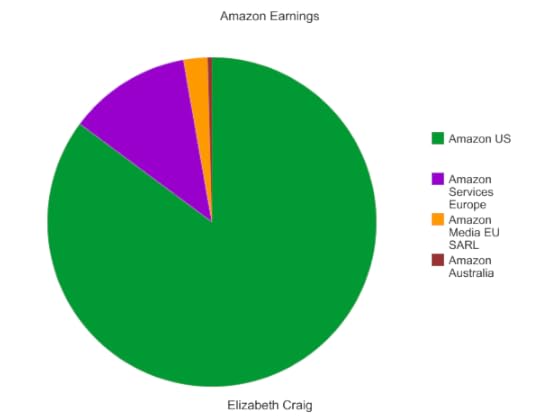
The chart above shows earnings by different Amazon regions.
Notes:
Earnings from my traditionally-published titles (2 sources/publishers) reflect 9 published books.
Self-pub earnings (everything else) reflect 6 published books.
The Apple percentage is artificially low because it reflects 1 book (I used Smashwords to distribute the others)
The Kobo percentage is artificially low because it reflects 1 book (again, I used Smashwords to distribute the other titles)
Takeaways:
The first thing I noticed was how low the Nook profits were. I mean…barely much over the CreateSpace or the ACX (audiobooks). Wow.
You’d think that a takeaway of mine should be that the trad published books brought in a lot less despite the higher number of titles. But this doesn’t come as a shock to me. :) Still, it’s pretty amazing seeing it on the graph. Here it is shown a different way:

It felt as if I didn’t make as much last year. I even told my accountant at the beginning of our appointment that I didn’t make as much last year. She told me I was wrong…I made a bit more in 2014 than in 2013. 7.1% more. Why didn’t it feel that way? I think the earnings still slowed…I had 3 more titles published in 2014. So it seems as though the earnings should have been higher.
Also, I think the fact that I put 50% of my earnings away for taxes (which really made me unhappy) made me feel as if I just didn’t have as much income. As self-employed people in the US, we’re employer and employee. Although putting that money away was a smart move.
What I did right last year (tax-wise)
As I’ve mentioned before, 2014 was the first year that I had a dedicated separate account for income and expenses related to my writing career. My accountant strongly urged me to create this account since the Internal Revenue Service here in the States doesn’t like seeing business income and household expenses mixed together. This worked really well. I was able to get a sense of my actual earnings a lot easier by reviewing the year’s deposits…even before the slew of 1099 forms arrived in my mailbox.
I put 50% aside for taxes.
I paid estimated quarterly taxes. This also helped avoid that huge tax bill I got in 2013.
What I think I’ll change for 2015 (tax-wise)
I need to divide my earnings up by publisher/retailer before seeing my accountant next year. I originally just turned in some lump figure of income. I’d also like to track my income quarterly to get a better picture of what I’m looking at as I’m going through the year.
I handed all my book production costs this year to my accountant as “production costs.” But in 2013, we’d divided them into editor fees, cover design, formatting, etc. I think I need to keep those divided up next year.
I need to remember that I need to get the 1099s for Smashwords, Apple, and Kobo downloaded off those sites. I’d forgotten that was a download.
I need to make my appointment with my accountant next year in mid-February. I got a flurry of 1099s in the mail earlier this week and I had to keep updating her.
So, that’s what I came up with. Did you make any interesting observations regarding your sales or earnings last year? Do taxes stress you out like they do me?
The post Tax Time Revelations appeared first on Elizabeth Spann Craig.
February 8, 2015
Why We Still Need Our Books in Print
By Elizabeth S. Craig, @elizabethscraig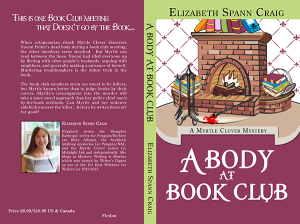
Sometimes I get surprised reactions both from non-writers and writers that I’m self-publishing in print as well as in ebook format.
I know some think print is dying out. From my observations, there aren’t nearly as many people purchasing in print as they are digitally. After working with my accountant on my taxes last week, it was very clear on the 1099-MISCs that my print sales for self-publishing were a tiny fraction of my ebook sales.
Would I turn this money down, though? Of course not. And the initial investment in print formatting and cover design has long paid for itself. It did take me a very long time to branch into print and I’m sorry I waited as long as I did.
Reasons we should self-publish in print as well as a digital format:
Goodreads giveaways. (Click the link and scroll down for information from Goodreads on this part of the author program. And a post I ran in 2013 gives information on setting up a giveaway there.) I’m not wild about Goodreads as an author, but their giveaway program has been a nice way for me to get reviews for new releases and provide more visibility for books. Only printed books are eligible for giveaways at this time.
Signings. I’ve been to conferences before where we’ve given out slips of paper with download codes for digital purchases…it’s just not the same. I’ve also been very frustrated with myself when I’ve gone to events and didn’t have any books with me. I try to remember now to always have some in stock at the house.
For readers to purchase as gifts. Although some readers don’t mind giving or receiving ebooks, some prefer to wrap up a physical book.
There are some people, likely fewer every day, who prefer not to read ebooks.
The price of your ebook will look like a steal next to the print price on Amazon.
Steps to publish your book in print (the non-self-service way):
If you have an ebook out and don’t have your book in print format, you’d ask your ebook designer to format your book for print. They’ll add a spine (you’ll want to give them your exact page count) and a back cover (you’ll want to either write back cover copy or else use what you’ve got as the book description on Amazon). They’ll want your headshot and short bio for the cover. You’ll need to tell them the dimensions of the book (the different possible dimensions are on CreateSpace or Lightning Source). This is not as time-consuming nor as expensive as you think.
Choose a company to print the books. You’ll likely want to go through either Amazon’s CreateSpace or Lightning Source. Here is a post that can provide you with some additional information: Giacomo Giammatteo’s post, “Watchdog: Ingram Spark vs CreateSpace for Self-publishing Print Books” for the ALLI Self-publishing Advice blog.
Upload it to the service you’ve chosen. They walk you through it on the printing site. You proof it and then approve it and it goes up for sale.
If you’re published, are your books in print? What made you decide to go that route? Are you glad you did? Any questions from anyone who hasn’t yet published in print?
The post Why We Still Need Our Books in Print appeared first on Elizabeth Spann Craig.
February 7, 2015
Twitterific Writing Links
by Elizabeth S. Craig, @elizabethscraig

Twitterific writing links are fed into the Writer’s Knowledge Base search engine (developed by writer and software engineer Mike Fleming) which has over 30,000 free articles on writing related topics. It’s the search engine for writers.
Characters and Character Relationships: http://ow.ly/Ii8xz @DavidBCoe
How to Edit: The CP Trade (video): http://ow.ly/Ii8xB @ava_jae
Sexiest Literary Villains: http://ow.ly/Ii8xD by Emily Temple @flavorwire
Polarization of Authors? http://ow.ly/Ii8xG by Kristin Nelson
11 Tips for Writing an Effective Email Newsletter http://ow.ly/Ii8xJ @danasitar
Is there an ideal age to write a masterpiece? – infographic: http://ow.ly/Ii8xN @guardianbooks
How Do You Handle Negativity from Others? http://ow.ly/Ii8xR @jamigold
Do Agents Still Hold the Gatekeeper Key to Getting Published? http://ow.ly/Ii8xT @jodyhedlund
Finding the Right Critique Partners: http://ow.ly/Ii6wN @sjaejones
Thinking through a place to write: http://ow.ly/Ii8xV @writingforward
How to Query Multiple Books: http://ow.ly/Ii8y0 @bookendsjessica
Agent answers query question: agent is quitting but wants to keep writer’s book: http://ow.ly/Ii8y4 @Janet_Reid
3 Reasons to Bundle the Early Books in Your Series: http://ow.ly/Imq6s @goblinwriter
Confused Words: Imply vs. Infer http://ow.ly/Imq6w @writing_tips
7 Things to Do Now to be Ready When Writing Inspiration Strikes: http://ow.ly/Imq6B @ediemelson
The Strategic Use of Book Giveaways: http://ow.ly/Imq6K @Janefriedman
6 Tips for Author Crowdfunding: http://ow.ly/Imq6R @robinrwrites
Stop Aspiring: http://ow.ly/Imq70 @Eric_Haywood
Acronym vs. Initialism: http://ow.ly/IgUOr @writing_tips
Readers Do Not Owe Writers Anything: http://ow.ly/IgUOq @givemeyourteeth
Unintuitive Findings About Weak Words And Their Use In Strong Writing: http://ow.ly/IgUOo @woodwardkaren
Thoughts on Referrals to Agents: http://ow.ly/IgUOl @bookendsjessica
Screenwriting: Nail The Subtext: http://ow.ly/IgUOj @medkno
5 Tricks to Keep a Modern Reader Interested : http://ow.ly/IgUOi @rogerdcolby
17 Famous Writers on Their Favorite YA Books | TIME http://ow.ly/IgUOh @DPD_
5 Things to Know About Award Nominations: http://ow.ly/IgUOg @nancyfulda
Punctuating interruptions in dialogue: http://ow.ly/IgUOe from Writeworld
Subscription Services for Self-Published Authors: http://ow.ly/IgUOd @EricaVerrillo
How to Sizzle up your Fiction with Compelling Characters: http://ow.ly/IgUO9 @RuthHarrisBooks
Compilation of Zombie Apocalypse Posts: http://ow.ly/IgUO8 from Ghost
Do You Get the Same Experience From Audiobooks and Print? http://ow.ly/Idj0V @nicholebernier
7 Ways Social Media is Like Driving a Car: http://ow.ly/Idj0R @EdieMelson
Character Motivation: http://ow.ly/Idj0L @HeatherJacksonW
21 Fast Hacks to Fuel Your Story With Suspense: http://ow.ly/Idj0B @ESimsAuthor
Punctuation Review: En Dashes: http://ow.ly/Idj0y @writing_tips
How 1 Writer Became a Morning Person: http://ow.ly/Idj0r @ava_jae
Employing character denial (especially for female romantic leads) can be tricky in our books: http://ow.ly/Idj0p @kid_lit
How the Year 2015 Is Depicted in Science Fiction: http://ow.ly/Idj0i @motherboard @beckyferreira
4 Elements of a Successful Author Attitude: http://ow.ly/Idj0e @ninaamir
Should Authors and Publishers Spy on Readers? http://ow.ly/Idj09 @arhomberg
5 Tips for Creating Metaphors: http://ow.ly/IdiZZ by Livia Nelson
How to be a Kindle Kids’ Book Creator: http://ow.ly/Idj01 and http://ow.ly/Idj02 by Claudia Cangilla McAdam
Stockings as a weapon in crime fiction: http://ow.ly/IktPq @mkinberg
A Step-by-Step Guide to Conducting the Research Interview: http://ow.ly/I9FyK @THahnBurkett
Advice for entering screenwriting competitions: http://ow.ly/I9FyE @screenandscripts
Why You Don’t Need a Literary Agent (but You Might Want One): http://ow.ly/I9Fyw @agentsavant
Working with a cover designer: how to make it easier for you and your designer: http://ow.ly/IvO8W @silas_payton
How to turn a short story into a novel: http://ow.ly/I9yxC @Roz_Morris
The winter of our discontent with the ISBN: http://ow.ly/IvGU8 @Porter_Anderson @DavidGaughran @janesteen
3 Ways To Be In Control While Still Working a Day Job: http://ow.ly/I9Fyp @iamtomnorman
Why We Need to Track Every Accomplishment: http://ow.ly/I9Fyh @JeffSandersTV
Finding and Honing In On Your Story http://ow.ly/I9Fy8 @kiersi
Architecture tips and links for writers: http://ow.ly/I9Fy2 from Writeworld
Jumpstart Your Imagination: http://ow.ly/I9FxW by Christina Hamlett
The Self-Publishing Sky is Not Falling: http://ow.ly/I9FxR @jamesscottbell
Top 3 Reasons Why Fiction Manuscripts Get Rejected: http://ow.ly/I9FxJ from M.J. Moores @passivevoiceblg
Writing with an Accent: Info for Writers: http://ow.ly/I9FxD @schmeterpitz
The trouble with categorizing people in crime fiction: http://ow.ly/ItiZx @mkinberg
Mind Mapping Your Book: http://ow.ly/I54dR @trainingauthors
5 Great Tips for the Writing Life from Edna Ferber: http://ow.ly/I54dM @ladieswhowrite
Writing from the Perspective of Marginalized Characters: http://ow.ly/I54dJ @wendyluwrites
10 Reasons to keep a writing journal: http://ow.ly/I54dE @everywriter
Items that may need to go to a publisher with the finished manuscript: http://ow.ly/I54dC @wendylawton
How to know if you have too many characters: http://ow.ly/I54dA from Fix Your Writing Habits
Self-Promotion for Horrible People: http://ow.ly/I54dw @SamSykesSwears
The 3 Most Effective Types of Inner Conflict: http://ow.ly/I54du @writers_write
How to outline a short story for beginners: http://ow.ly/I4K57 @writers_write
A Story Structure In Three Acts: Act Two: http://ow.ly/I54dt @woodwardkaren
What not to do when querying agents: http://ow.ly/I54dn @C_Herringshaw
A place to find a critique group or partner: http://ow.ly/I4XTj @Janice_Hardy
Physical limitations and vulnerabilities in crime fiction: http://ow.ly/Iktm4 @mkinberg
Music For Writers: The Colorist Kaija Saariaho’s ‘Instants’ Of Love: http://ow.ly/Ikrf1 @Porter_Anderson
5 Commandments of Storytelling: http://ow.ly/I3ylI by Shawn Coyne
The Writing Business: Making Goals: http://ow.ly/I3ylH @kristaphillips
The Finances of Publishing: http://ow.ly/I3ylG @PavartiKTyler
How to Write Better Stories and Finally Win Out : http://ow.ly/I3ylC @yeomanis
Basic Elements of Flash Fiction: http://ow.ly/I3ylA @prasanga1
A Story Structure In 3 Acts: http://ow.ly/I3yly @woodwardkaren
Finding the Hero: http://ow.ly/I3ylx @JessicaMarkwel1 @womenwriters
Does ‘Writing Community’ Really Foster Writing? Or Community? http://ow.ly/IkmTM @Porter_Anderson
The 2 Best Reasons to Fail as a Writer: http://ow.ly/I3ylu @MudpieWriting
‘Churning It Out’ : http://ow.ly/I3yls @KristineRusch
Branding 101: What’s Your Story? http://ow.ly/I3ylq @jamigold
3 Kinds of Micro Fiction: The Drabble, 55 Fiction and The Twabble: http://ow.ly/I3ylp @woodwardkaren
6 Things Every Writer Needs to Succeed: http://ow.ly/I3yln @mlswift1
Video and arcade games in crime fiction: http://ow.ly/IkrHV @mkinberg
Writers: Sit Without Back Pain: http://ow.ly/I3ylz on Blood-Red Pencil
How To Make Blogging Work As An Author: http://ow.ly/IfjP3 @annerallen @reedsyhq
Foreknowledge is not foreshadowing: http://ow.ly/HWcHm @lindasclare
Goal Setting: http://ow.ly/HWcHj @CMKaufman
Beyond Beautiful: The Significance of an Objective Critique: http://ow.ly/HWcHh @brevitymag @KDStechschulte
Capturing the Vile Voice of a Villain: http://ow.ly/HWcHd @raynehall
Write Like a Cow: On Taking Craft Cues from Your Subject: http://ow.ly/HWcH6 by Nancy Geyer @brevitymag
9 Ways Writing Short Stories Can Pay Off for Writers: http://ow.ly/HWaYc @annerallen
The post Twitterific Writing Links appeared first on Elizabeth Spann Craig.



